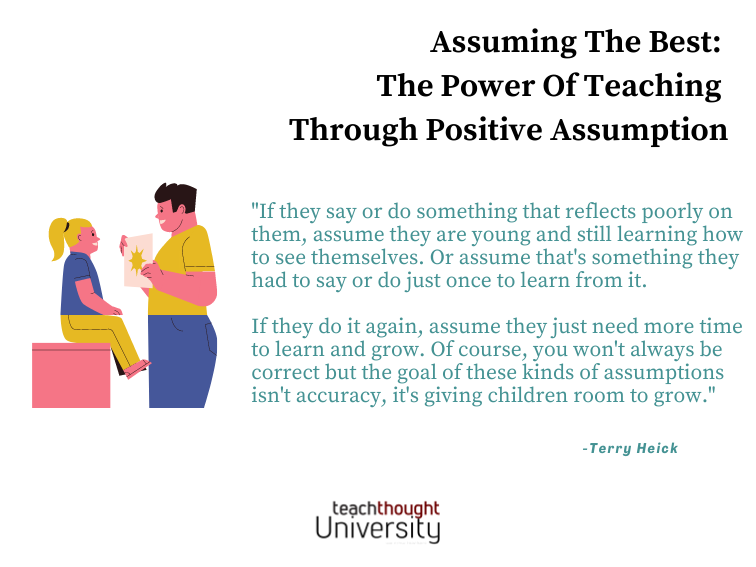
What Happens When You Assume The Best In Students?
Always assume the best in students; at worst, assume there’s more to know.
If they fail, assume they tried and want another chance. Assume they weren’t aware of what they weren’t aware of or that they don’t understand the scale or effects of the failure.
If they break a rule, assume they weren’t aware of the rule. At worst, assume they had forgotten.
If they say or do something that reflects poorly on them, assume they are young and still learning how to see themselves. Or assume that’s something they had to say or do just once to learn from it. If they do it again, assume they just need more time to learn and grow. Of course, you won’t always be correct but the goal of these kinds of assumptions isn’t accuracy, it’s giving children room to grow.
The suppositions you have about your students and why they do what they do is a powerful thing. And those suppositions often come from a mindset you have about what a teacher is ‘supposed to do’ and what a student is ‘supposed to do.’ They can create that kind of mindset, too (here are 25 Ways To Help Students Create A Growth Mindset.) Meaning what you assume can impact what you think and believe about teaching and learning. It goes both ways and assuming the best about students–even when you know intellectually that you’re wrong and that supposition isn’t true–can transform the tone of your classroom.
See Tone In Teaching: 20 Words That Can Affect The Tone Of Your Classroom
Assuming the best in students shouldn’t just be a way of thinking, but rather a way of teaching. It should come out in how you speak (‘Because I know how important reading is to you, I’m surprised that I haven’t noticed you reading as much over this semester).
It should come out in how you teach (giving them 2nd and 3rd and 4th chances to complete assignments).
It should come out when you speak to parents about their child, and even when you design that next project-based learning unit as you assume the best in their potential and help them see for themselves what they’re capable of.
In the face of pressure for performance–from you and from students–patience can seem like a luxury. As a teacher, you’re not paid to be patient or to give endless opportunities or show infinite and possibly irrational optimism.
Except that you are.
If you need to think about patience and opportunity as bridgeways to performance, that’s okay. You can also think of it the other way around. We all have a strong temptation to teach lessons to others, but there is a timing to understanding that is exceptionally difficult to pin down.
The lives of students are messy and pressure-filled and confusing. They’re kids–even when they’re in college. Their childhood is their time to live and learn and fail and learn and succeed and learn. That time never really ends; we all are failing and living and succeeding and learning everyday.
But for children, it’s an especially sensitive time as they are developing their sense of self and need support in growing the kind of identity and mindset that will serve them for a lifetime.
Assuming the best in a child, even when they give you reason to think otherwise, is one of the most significant investments you can make in their future.
Always assume the best in students; at worst, assume there’s more to know.
